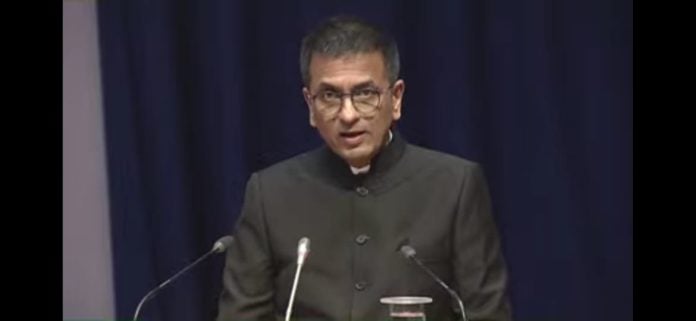Chief Justice of India DY Chandrachud stressed on the need to have an open and transparent process for the recruitment of law clerks in the Supreme Court.
Speaking at the Supreme Court Bar Association’s felicitation function organised for the eight newly-appointed judges of the Supreme Court recently, he said all his law clerks came from absolutely unconnected backgrounds from all over the country.
None of them came from a legal family and they were doing some brilliant work, he added.
The CJI said that having a transparent process for the recruitment of law clerks was part of the process of opening up the Supreme Court to the citizens at large and sending a message of confidence to young lawyers across the country.
He added that when they recruited law clerks to assist Supreme Court judges, they were also training lawyers for the future, which in turn was an obligation of giving back to the members of the bar.
During his speech, he said there was a need to have law clerks from across the country, and not just those who were connected or those who came with recommendations.
The CJI revealed that the Supreme Court has come out with a new examination scheme for the law clerks, which was likely to take place in May.
As per the CJI, he, along with fellow Apex Court judge Justice Sanjay Kishan Kaul, had chaired a committee which came out with a white paper, based on they had prepared the new examination pattern for law clerks.
He said the idea of the examination was not to test the memorisation capacity of the lawyer, because it was not relevant in a court. Rather, it would test the analytical skills, which were very relevant for a law clerk.
The examination will take place in two phases. The first phase will have multiple choice questions (MCQs) for 300 marks. The second phase will have two questions for over three-and-a-half hours.
Those appearing for the exam would get half-an-hour to read the paper and then three hours to answer two questions. The first question will be to prepare a brief from a mock judgment and then a research paper.
In the two questions, the answer should not exceed 750 words each. The idea behind the exam was to test the analytical skills of the law clerks, noted the CJI.
The law clerks will be engaged purely on a short-term contractual assignment commencing from the re-opening of the Court after the summer vacation and concluding by the end of the following year’s summer vacation.
The term can be extended for the succeeding year, subject to the satisfaction and approval of the judge with whom the law clerk is attached or the senior-most judge of the Committee of Judges on Law Clerks, he revealed.
He said a law clerk would be paid a remuneration of Rs 80,000 per month for the assignment term, and if given an extension after 12 months of the initial assignment, then a remuneration of Rs 90,000.
The judges of the Court will be entitled to engage four law clerks, of which two will mandatorily be through the selection process of the Registry. They will also be free to engage all four through the procedure. Moreover, subject to their workload, they can engage five law clerks.
As per the scheme, a law clerk will not accept any other assignment and shall not practise as an advocate in any court of law during their assignment.
Candidate studying in the fifth year of a five-year integrated law course or the third year of the three-year law course after graduation in any stream will also be eligible to apply.
The candidate must not be below the age of 20 years and above 30 years as on the final date for registration, which is April 30, 2023.


